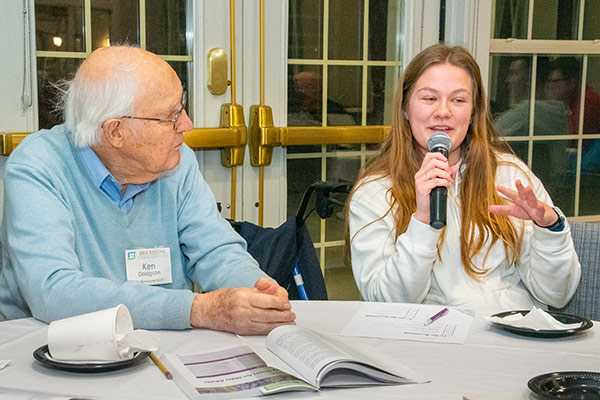Gerontology
The interdisciplinary gerontology program at Nazareth University is an immersive, experience-based program designed to prepare you for graduate work in aging and careers working with older adults, their families, and caregivers. A minor in gerontology enhances coursework from many majors, such as speech-language-hearing sciences (formerly communication sciences and disorders), social work, psychology, nursing, physical therapy, and music therapy.
The minor in gerontology gives you the opportunity to learn about the aging experience from multiple perspectives, not only in the classroom, but also in the community. This knowledge allows you to question existing beliefs about aging and to ultimately apply your skills and values for the betterment of the aging experience for all generations.
A key feature of the gerontology program is the St. John's/Nazareth University Gerontology Program partnership, started in 2009, which brings Nazareth students and elders from St. John's Meadows together to learn with, and from, one another. Weekly classes take place at St. John's where students and elders learn alongside one another.
You are encouraged to participate in at least one internship related to gerontology at an aging services provider, hospital, or elder living community to supplement and reinforce learning through:
- Contact with professionals in gerontology and geriatrics
- Experiencing the joys and challenges related to growing older today in multiple contexts
- Witnessing ways that society responds to the topics raised in the classroom
- Opportunities to evaluate your personal expectations and responses to working with, and for, older adults
Career Outlook
- The number of Americans ages 65 and older is projected to grow 47% from 2022 to 2050, becoming nearly one in four of the total population. Shortages are forecast in professions such as physicians who are specialized in primary and geriatric care.
- The Association of American Medical Colleges (AAMC) reports that by 2034 the U.S will experience a shortage of approximately 37,800 to 124,000 physicians across multiple specialties including primary and geriatric care.
- The Geriatrics Workforce Policy Studies Center at the American Geriatrics Society has estimated that by 2030 over 30% of older adults will need some form of geriatric-focused care.
- Recent research estimates the cost of ageism in health care to be $63 billion annually (Park & Martin, 2023).
Given all of these statistics, the gerontology program is deliberate in the experiences we create for our students to learn about, and directly from, older adults in our community.

Students honored
Nazareth students studying aging alongside elders, and together supporting community nonprofit organizations, were honored with an Outstanding Young People in Philanthropy award.
Example Careers
- Home health care management
- Elder center management
- Community planning
- Health and aging policy
- Intergenerational programs
- Legal analysis and advocacy
- Marketing, design, and product development
- Technology and aging
- Human resources
- Volunteer program management
- Long-term care administration